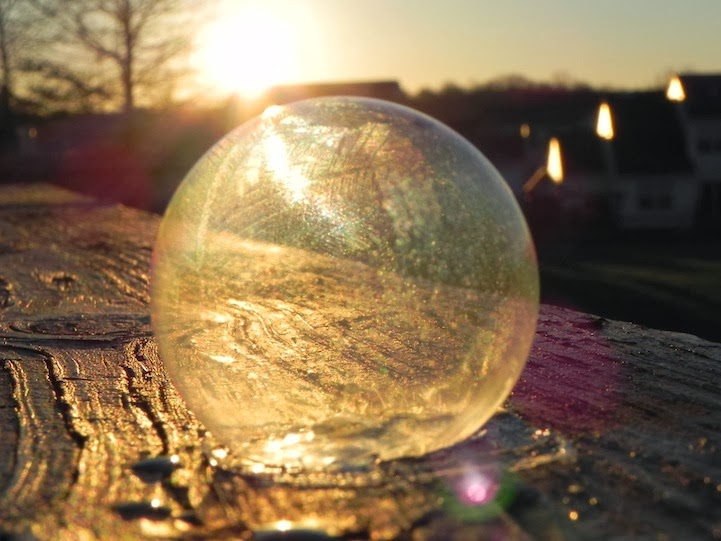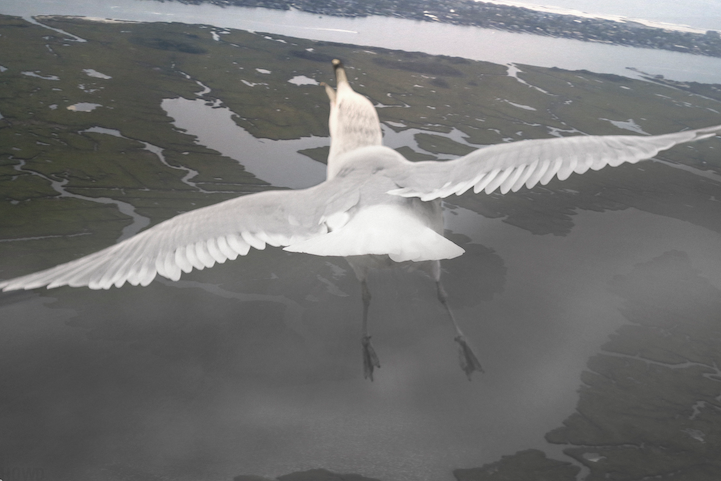Codedheart ultimately decided to share few unquestionable stunning
images of a friend took of frozen bubbles up-close, enlightening the
crystalized formation of ice that looks like feathers. We have seen
various
amazing photographs of soap bubbles that have turned to orbs of ice in
frigid temperatures just a few weeks ago, but these pictures offers a
new outlook of the tiny, fragile spheres as something even more magical.
Every fabulous image looks like a remarkable
composite of glossy quills within a clear dome, but are really the
surfaced bubbles solidifying into icy pockets of air. They are amidst a
freezing procedure as the ice crystals feather out from the bottom, up.
The ultimate result is an unbelievable pattern
across the delicate bubbles, magnetically drawing the view's attention.
Tuesday 21 January 2014
Monday 20 January 2014
Exclusive Pictures of Motion of Birds in Mid-Flight
Photographer Howard Lau, is creative nature & animal photographer,
who actually captures the exclusive motion of birds in mid-flight. In
the photo series, you see Lau has created sensations to viewers soaring
high up in the sky alongside each bird. Lau provides its followers to a
unique and rare opportunity to see an actual bird’s eye perspective of
the world by merging multiple images together into one composition. The
profound views focus on individual birds
soaring above stunning landscapes with wings spread wise. The talented
photographer depicts the crisp details of bodies, beaks, legs and
skillfully feathered wings in the unique and astonishing moments. Lou
gives his images title to “A Better Tomorrow”,
soul
searching and all around the world and as the birds fly bravely through
the world, probably looking for adventures. All the viewers are invited
to develop creative narratives about each bird’s life. Where are they
going and where will they land? Do they have
families and friends? Where do they live? The photographer says, "My
aim is still the unchanged no matter what kind of taking photos that I
am into to tell a story through the lens.
Sunday 19 January 2014
Snow Tree
Italy based photographer Niccolo
Bonfadini captures a stunning photos of wintery seasons when trees are entirely
overwhelmed by snow and ice in Subzero temperatures. Off course snow is nothing
new to wintry weather but the cloud-like shells in every image mask the trees
in a frosty armor with nothing but snowy grounds surrounding them as far as the
eye can see. The setting alone is remarkable, but the photographer's acute eye
and patience deals a naturally surreal view of a frozen landscape.
With temperatures ranging from
-40°C to -15°C Niccolo Bonfadini has managed to snap stunning shorts of frozen
trees as though they are alien creatures emerging from the ground, when he
traveled to the Finnish Lapland in the cold of winter. He insists that the bitter
cold was truly bearable, given the lovely view. The professional photographer
patiently camped out on the scene and awoke early enough to set up his camera
for some truly remarkable shots of the landscape just before sunrise. One of
his images, titled Sentinels of the Arctic, even wound up catching the eye of
NASA as the Astronomy Picture of the Day.
Friday 17 January 2014
Chrysopelea, A Flying Snake
We’ve always believe nature is so
amazing and its creations sometimes baffle the humans minds. Who is the
creature of these bewilder species. Have you ever heard a snake can fly? Yes;
Chrysopelea, is famous for flying, actually belongs to the family Colubridae.
Flying snakes are not too much venomous and considered harmless. Its toxicity
is not dangerous to peoples. Normally flying snake can be found in South Asian
countries such as Philippines, China, India and Sri Lanka. Chrysopelea is notorious
for “flying Snake” glides by using its ridge scales along its belly, pushing
against rough bark surface of tree trunks, letting it to move vertically up a
tree. Chrysopelea hunts for foods during the day, and they like lizards, frogs,
birds and bats.
When he reaches the end of a tree’s
branch the snake continues moving until its tail dangles from the branch end,
and then it makes a J-Shape bend leans forward to select the level of inclination
it wishes to travel to control its flight paths, as well as selecting a desired
landing area. Once it decides on a endpoint,
it pushes itself by thrusting its body up and away from the tree, sucking in
its stomach, flaring out its ribs to turn its body in a "pseudo concave
wing” all the while making a repeated serpentine motion of lateral undulation
parallel to the ground to stabilize its direction in midair in order to land safe
and sound.
The mixture of sucking in its
stomach and making a motion of lateral undulation in the air makes it viable
for the snake to glide in the air, where it also copes to keep energy compared
to travel on the ground and dodge terrestrial bounded predators. The concave
wing that a snake generates in sucking its stomach flattens its body to up to double
its width from back of the head to the anal vent, which is adjacent to the end
of the snake's tail, causes the cross section of the snake's body to look like
the cross section of a Frisbee or flying disc. When a flying disc spins in the
air, the designed cross sectional concavity causes intensified air pressure
under the center of the disc, causing lift for the disc to fly. A snake incessantly
moves in lateral undulation to generate the identical effect of increased air
pressure underneath its arched body to glide.
It’d be interesting to know that
flying snakes are capable to glide better than flying squirrels and other
gliding animals, notwithstanding the lack of limbs, wings, or any other
wing-like projections, gliding through the forest and jungle it inhabits with
the distance being as great as 100 m. In the recent research conducted by the
University of Chicago, the snake ability to glide has been an object of interest
for physicists, and they found a correlation between size and gliding ability,
in which smaller flying snakes were able to glide longer distance horizontally.
So far there’re five recognized
species of flying snake, found them India to Indonesian archipelago. Some of
them are Golden Tree Snake (Ornate Flying Snake), the largest flying snake
having 4ft in length, with different color variations. Due to its smaller size
it’s gliding ability is weak. The other is Paradise tree snake, is a flying
snake reaches up to 3ft in length and is
famous in the European pet trade. The most famous coloration bodies are black, covered
in rich green scales, clusters of red, orange and yellow-colored scales in the
shape of flower petals line the dorsal area from the base of the neck to the
tail. It’s gliding ability is considered one of the best among the flying
snakes. Twin-barred tree snake also called banded flying snake, is the smallest
flying snake reaching up to 2ft in length, with the base color is black or dark
grey, and the entire body is covered with thick red and thin yellow with black
bands. it does not glide.
Wednesday 15 January 2014
What a Man, hasn’t bathed in 60 Years
An 80 year old Iranian has broken the world record for the number of years he has let elapse since he last bathed himself. Iranian media reported, Amou Haji has not bathed for 60 years. The man believes cleanliness brings him to illness; so he won’t interested in showers at all.
His life style is amazing, includes eating rotten meat, exclusively porcupine meat, and drinking dirty water. More interesting, his smoking pipe is filled with animals’ feces instead of tobacco. He normally wears war helmet not to fight off the enemy in the battle field but to keep away from the bitterly cold winters. He lives in a hole in the ground just like a grave keep him grounded and other is an open brick shack built by those who felt sorry for him.
Amou roof is the starred sky, without worry about monthly mortgages, his pillow and quilt is the soft cushion of the earth embracing him every time. He has no fear of getting rubbed at nights, and feels happy despite of having no belongings which makes him joyful. Last year, Kailash Singh 66, who had not showered for 38 years old spending years without cleaning himself however Guinness reportedly won’t offer an award in that category.
Monday 13 January 2014
Ford Hybrid Semi-Solar Vehicle Could Usher In A New Era Of Green Rides
The theme of a green vehicle has absolutely
gained traction. Over all, fossil fuels are finite in terms of its obtainability,
and it is sagacious to start paying consideration to renewable fuel and energy
sources to have the constantly growing automotive industry moving along in the accurate
direction. Ford has taken the idea of hybrid cars, and they plan to work on a
hybrid Sei-Solar automobile that will be capable to run partly on sunlight, which
is extremely a good thing. You know very well; the sun rises in the east and sets
in the west every single day. And for most of us live in some faraway place
that provides you half a year of sunlight and another half a year of darkness.
What you understand above is not what Ford has in mind on our roads, but it is
just there for instructive resolutions. Ford’s has focused on the idea would be
based on the C-Max platform well-known as the Solar Energi. C-Max happens to be
a compact which has already been constructed with distinct regard to gas
mileage, where the photovoltaic panels that line the car’s roof are adept of
giving up to 34 KM of range on pure electric power alone, and it can hit a
whopping 1000 KM based on electric-assisted gas power. Indeed, we have no awareness
on how long the charge time is at the moment, so positively details will be
ironed out in due time.
Saturday 11 January 2014
Frozen Views of Niagara Falls Unusual?
These days stunning frozen photos
of Niagara Falls are widely spreading across on the social media. New York and
Ontario are marveling at the site of the frozen falls. The ice laden waterfall
is not all that surprising at least according to one meteorologist. A
Meteorologist John Rozbicki, actually waterfall is not frozen over, but the
water is going to continue to flow underneath. The falls has too much water to
completely freeze over, but on several occasions formed an ice bridge over the
lake, and winter phenomena is surprisingly common. The history shows, visitors
were permitted to walk across on the ice bridges till 1912, when accidentally three
people killed. Ice bridges are uncommon, and even with the polar vortex, it was
not cold enough to create a bridge. The recent wave of cold weather has
produced a gorgeous array of winter for photographers. Here are some of best
ones from social media users.
Subscribe to:
Posts (Atom)






































